INVESTIGATION… ITSEKIRILAND: Abandoned projects litter community as leaders ‘swallow’ Chevron’s N7.2bn development fund
In 2005, Chevron Nigeria Limited established the Itsekiri Regional Development Council (IRDC) and disbursed N7.2 billion to it for the development of 24 Itsekiri communities. Eighteen years after, Itsekiri land is still in shambles as money disbursed by Chevron seems to have gone down the drain.
Kelechukwu Iruoma, a freelancer with RIPPLES NIGERIA, went through the creeks and visited four Itsekiri communities to unravel how over N7.2 billion meant for Itsekiri-land development was apparently mismanaged with abandoned projects littering everywhere.
Twenty four Itsekiri women sit on three benches at one side of the State High Court chambers in Warri, Delta State, Nigeria waiting for the arrival of the Chief Judge. With rage etched on their faces, they hiss and continuously shake their heads in defiance.
The moment the Judge stepped in, everyone in the court rose. The court clerk read out the case file and the first case was Chief (Mrs) Rita Lori Ogbebor against Keystone Bank, Chief Ayiri Emami, Austin Oniyesan, Richard Omare (representing Itsekiri Regional Development Council) and Chevron Nigeria Ltd (CNL).
The case was what brought the women from 24 Itsekiri communities to the court. After the proceedings, the Judge adjourned the case. The women stood and headed towards the exit. As they walk hesitatingly, they began calling the defendants criminals, lamenting that Itsekiri people do not have anything to show for the oil and gas they own.
They want the Itsekiri Regional Development Council (IRDC) and Chevron Nigeria Limited (CNL) to be held responsible for the lack of development in Itsekiri land.

Aggrieved… Itsekiri women at the State High Court, Warri, Delta State
Chevron established IRDC to develop Itsekiri communities, but…
Chevron is one of the oil companies exploring crude oil in the Niger Delta area of Nigeria. Its exploration activities have allegedly caused environmental pollution, which has affected the biodiversity of the Niger Delta areas, contaminating rivers and farms. The Itsekiri people protested, claiming CNL would not explore their oil without assisting in the development of the oil producing communities, which were in shambles — no good roads, no hospitals and electricity supply and they no longer go to the river to fish — because of the pollution of the waterways. Itsekiri land was so uninhabitable that the indigenes had to relocate to Sapele and Warri.
In 2005, Chevron introduced a Global Memorandum of Understanding (GMoU) governance model to promote sustainable development and foster community engagement in its areas of operation in the Niger Delta, including Itsekiri communities.
The GMoU led to the establishment of IRDC whose function was to award contracts and execute various projects for the sustainable development of 24 oil producing Itsekiri communities. The Council in partnership with Chevron tours the communities, and the council proposes projects that could ameliorate the sufferings of the people, for which the company makes funds available.
The communities are located in Warri North, Warri South and Warri South West local government areas. They include Aja-Amita, Ajudaibo, Bateren, Deghele, Ebrohimi, Eghoro, Gbokoda, Ijaghala, Jakpa, Kolokolo, Madangho, Obaghoro, Ugborodo, Ogidigben, Omadino, Sagharatie, Tebu, Tisun, Udo, Ugboegungun, Ugbolegin, Ureju and Usor.
From the commencement of the GMoU in 2005 to date, CNL in a response to Ripples Nigeria through its General Manager, Policy, Government and Public Affairs, Esimaje Brikinn, claimed the company has disbursed over N7.2 billion to the IRDC. The company said the documents showing the disbursement of money to IRDC annually are available but cannot be shared.
IRDC opened seven accounts with the Keystone Bank. After 18 years of operation, Itsekiri communities are still in shambles as there is still no sustainable development, Ripples Nigeria can confirm.

Two abandoned two-bedroom bungalows in Deghele community
In 2015, the Council led by the past chairman and current Ologbotsere of Warri Kingdom, Chief Ayirimi Emami, was alleged to have embezzled the money meant for the development of the communities, with abandoned projects littering the communities. This issue led to an internal leadership crisis within the IRDC.
Did Chevron connive with IRDC to halt development in Itsekiri?
Itsekiri people not only believe that the Council embezzled the money; they also allege that Chevron Nigeria Limited connived with the Council to halt development in the communities. It was the Igba of Warri, Chief Rita Lori, who took the Council and Chevron to court.
In September 2017, the State High Court granted an order of interlocutory injunction restraining Keystone Bank from releasing any sum of money in any of the seven bank accounts to IRDC.
The court in its judgment also gave an order of interlocutory injunction restraining Chevron Nigeria Limited from further paying the IRDC any money that accrues to any of the oil and gas producing communities of Itsekiri nation pending the hearing and determination of the court. The amount in all seven accounts estimated to have been frozen was N2.1 billion.
The crisis within the IRDC led to a change of leadership. With the intervention of the Delta State Government and the Olu of Warri, the IRDC resolved its leadership dispute and appointed Mr. Austin Oniyesan the new chairman. The new leadership, however, wants the court to unfreeze the seven accounts in Keystone Bank, but the lawyers representing Chief Ogbebor have refused until Chevron and IRDC give an account of how the N7.2 billion was disbursed and spent.
“Chevron cannot leave America and come to Nigeria and take our monies and destroy our communities. Whatever money that is due to Itsekiri land, should be properly accounted for and spent for the benefit of the Itsekiri people not just for few men who overnight turn to billionaires and are now using the youths as their thugs,” said Kunle Edun, one of the lawyers.
“We don’t have any hospital where we give birth,” Queen Aweto, one of the women tells Ripples Nigeria. “Some of our children have gone to the university but there is no work and some are done learning trade but no money to start a business. And all the people (IRDC) are stealing the money meant for the Itsekiri. We are suffering.”
“When you reach our communities you will pity us. I am a trader but for three years, I have been sitting at home doing nothing. Because of pollution, our water has been contaminated and I don’t see fish to catch anymore”, she lamented.
The women are furious that despite the fact that Itsekiri people are the ones controlling the Council, they still pocket money which is supposed to be used to develop the communities. “Itsekiri women will not allow Itsekiri to spoil. Itsekiri is a nation known in the whole world. Our men (IRDC) have sold Itsekiri to foreigners and we will not agree,” Queen Tenu lamented.

Abandoned health centre in Deghele community
IRDC is an illegal body not known to law
Peter Aihiokhai is the second Itsekiri lawyer representing Chief Ogbebor. He and Edun called IRDC and Chevron criminals, noting that when IRDC was established by CNL, it was not registered by the Corporate Affairs Commission (CAC). Ripples Nigeria also confirmed that IRDC is not registered by CAC. Aihiokhai described IRDC as an “illegal body of a group of persons formed to get hold of what the Itsekiri nation is entitled to.
“Chevron is in conspiracy with IRDC,” says Aihiokhai. “IRDC is a body set up by Chevron in cahoots with Delta State government and few people in Chevron to loot the treasury and deny the people — the children, the women and youth of Itsekiri land — of their commonwealth,” alleged Edun, who is the vice chairman of Nigeria Bar Association, Warri branch.
“How can Chevron, an international entity and a responsible company be paying billions of dollars into an account open by an unknown and unregistered entity?” Edun questioned. “Look at Itsekiri land today, you cannot see anything that you can call paradise in an oil setting and this is where billions of dollars are being made from and there is nothing to show for it.”

Kunle Edun… Lawyer for the Itsekiri people
After 18 years of existence, Chevron said IRDC is “currently undertaking the process of registration with the CAC.”
A journey to four Itsekiri communities
When he commenced his investigation, our reporter was severally warned by some Itsekiri people he spoke to not to take unnecessary risks that lives have been lost due to the internal crisis within IRDC. Despite a series of warnings, he embarked on the journey, albeit discretely, to the creeks. The plan was to visit Deghele, Bateren, Tebu and Gbokoda communities in Itsekiri, and the only access to the communities is by water with a speedboat.
That Thursday morning at Rex Jetty, it was cloudy. Gabriel, the speedboat rider prepared the two boat engines for a journey he described as “long journey.” The trip started at 8:07 pm and they reached Deghele, the first community at 10:27 am.

Welcome to Deghele Community
When the team arrived at Deghele, we could not alight from the boat as there was no jetty. Three persons from Deghele helped to evacuate the journalist and his fixer from the speedboat with the help of a canoe.
“Who are you?” A man with a thick voice asked. Knowing that there could be serious consequences if he identified himself as a journalist, the reporter claimed to be representing a non-governmental organization looking at underdevelopment in Itsekiri land with a view to assisting the communities.

Abandoned N12 million IRDC 2-bedroom bungalow in Bateren
Itsekiri communities in shambles
Deghele is swampy, with a long tarred road constructed by the Niger Delta Development Commission (NDDC). Only a few people were seen living in the community as lack of housing had made indigenes leave for Warri and Sapele.
The community does not have a functional health centre as the one built has been abandoned and no equipment or health officials had been deployed to there. Some indigenes without houses have turned the health centre to living quarters.
The school in the community has been abandoned. The road leading to the school has been covered by weed and flood has made it impassable. No teacher or equipment was deployed to the school when it was completed. Children are taken to Warri and Sapele to attend schools by their parents.
“We drink river water contaminated by crude oil and we drink well water because we don’t have a borehole; the borehole project has been abandoned”, says Steven Golly, the youth chairman of Deghele”.
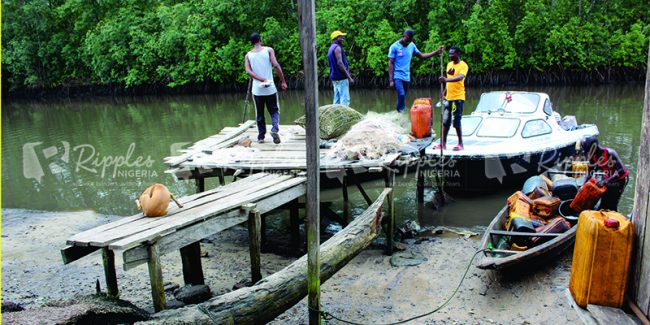
No jetty in Deghele community
Two-bedroom detached bungalows, jetty/walkway, hospital, health centres, town halls, schools and farms for the communities are some of what the Chevron money was meant for. But, all these except few completed bungalows are rarely found in the communities.
There are two-bedroom bungalows built and completed by the IRDC in Deghele while others have been abandoned since 2010 and 2013. The projects were awarded to various contractors, mostly registered by CAC. As a result, many indigenes who do not have houses were attached to other houses while they are supposed to be living in their own bungalows.
Golly said some of the projects were not awarded by IRDC officials. “Some they sell, they didn’t bring the projects here. After claiming to have awarded contracts to the contractors, they will snap already completed houses elsewhere and tell people they have completed the projects. They embezzled money for house projects. A two-bedroom bungalow costs N12.7 million and there are many of them abandoned in Deghele.
Poverty everywhere
Many people in Deghele are jobless. “We are suffering — No job and no business — we are just here,” says Golly.
Olearaja Samson Amola, 93, is the oldest man in Deghele. He was held by his left hand and brought out by his wife who seats him on a chair in front of a liquid-crystal display television. “The major thing that is essential to the community now is water,” he said. He kept repeating water angrily until he was asked not to speak again by Golly.

Another abandoned IRDC two-bedroom bungalow covered by weeds in Deghele
In the last five years, Ben Eburajolo has travelled to Deghele to spend Christmas but he says he does nothing when he travels. “For antenatal care, we rush our pregnant women from Deghele to Warri. Some of them die on the way. It’s just so sad,” he said.
In Bateren, a journey of about 25 minutes by water from Deghele, everything is the same. Indigenes are suffering and doing nothing. There is no jetty, no electricity supply, no water, no good road, no job and there are abandoned detached bungalows all over the place. Everything in the community is in shambles.
“Our major challenge is the road. We are just managing to survive. We have abandoned projects by the IRDC and they just abandoned them there,” said Eugene Fregene, the national assistant public relations officer of Bateren.
An old woman in her 90s lies on a mat and partly covers herself with a mosquito net. She cannot talk and is being looked after by a teenage girl. She looks sick. She lies in one of the wards in the health centre abandoned by IRDC in Bateren.
A document “The Odyssey of Waste: A Case for Itsekiri Development Master Plan” that details the projects awarded, executed and abandoned in Itsekiri land, showed that IRDC in 2008 awarded the contract for the construction of the health centre, which has been covered by weed, for the sum of N56, 935, 363 to Moofreg International Services.
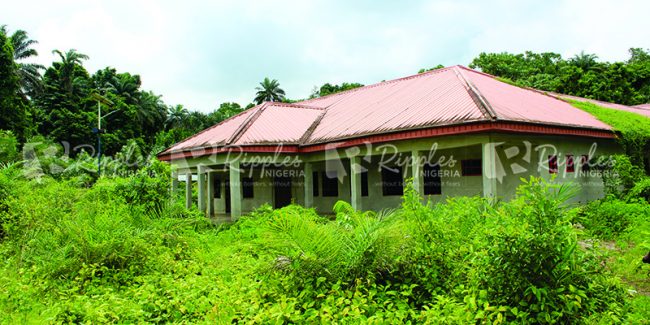
Abandoned healthcare centre in Deghele
Tebu and Gbokoda communities are close to each other. The tarred road connecting them was constructed by the NDDC. But the two communities still lack necessary basic amenities and have many abandoned projects started by IRDC. Bateren to Tebu is about 20 minutes, and like Deghele and Gbokoda do not have a functional jetty/walkway.
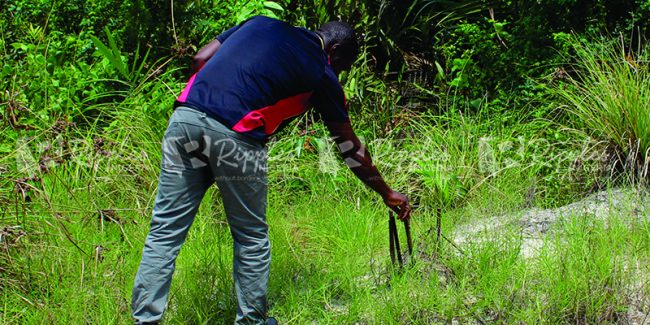
Location of the abandoned Tebu jetty covered by weeds
Abandoned projects all over
The document revealed that a contract of N116, 858, 000 was awarded to GbeMisan Nigeria Limited by IRDC for the construction of a jetty/walkway for Tebu community in 2007. But findings by Ripples Nigeria revealed that the project has been abandoned at the foundation level. The permanent location where the jetty was supposed to be located has turned into a bush.
Having waited for years for the construction, the community decided to construct an imperfect plank walkway for indigenes to pass through. The plank walkway has become weak, and one has to be careful when on it not to fall.

A three-year-old girl struggles to walk on the plank walkway bulit by Tebu community leaders
As this reporter passes on the walkway, a three-year-old girl runs after her mother who left her behind. As she walks, she struggles for balance and almost fell until her mother rescued her. There are complaints from kids and parents in the community who say they fell into the bush and got injured.
Many people in Tebu and Gbokoda communities have been living there from birth but say they have not seen any positive development. Kingsley Omamogho, Tebu community home-based PRO says he attended his primary and secondary school in Gbokoda. Of the four communities visited, only Gbokoda has a functional school and Tebu school children walk for about 40 minutes to attend school in Gbokoda.
The abandoned two-bedroom detached bungalows in the four communities visited have no windows, tiles or toilets with the paintings, the electric wirings undone.

Sign board showing the contractor and client of the abandoned N467 million Oleru water project in Tebu
“The major developments we need in this community are healthcare and very good water to drink. Our people take water from the well to drink and from the polluted rain. You see the oil companies’ flames which pollute the water,” Omamogho showed the reporter.
‘People no longer last long in the communities’
The drinking of polluted water in the communities has had its implications on the lives of Tebu and Gbokoda communities. “People no longer last long in this community. Different unknown illnesses kill people”, Omamogho offered.
The water project in Tebu called “Olero Field Water Project” has been abandoned and the community finds it hard to get potable drinking water. The project, worth N467 million, was awarded by IRDC to CGS Worldwide Solution. The project is becoming a waste and has been outgrown by weed and the installed equipment is rusting. The pipes to connect to various communities have not been laid.
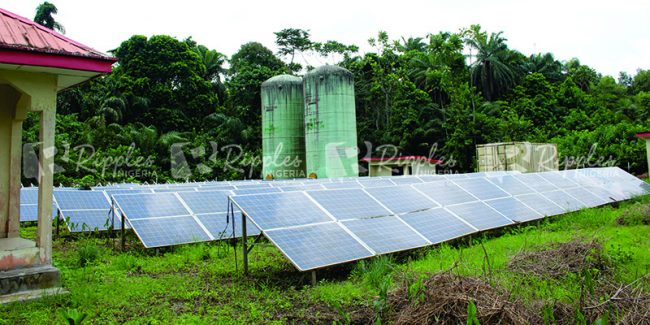
Abandoned 467 million Olero water project in Tebu by IRDC
“We don’t have healthcare facilities. We only transport our sick people to Sapele or Warri and from here to Warri is three hours’ drive by speedboat and from Sapele, it is about two hours 30 minutes,” said Omamogho.
A hospital was built in Gbokoda by IRDC but it is not functioning. When Ripples Nigeria visited the hospital, it had been covered by weed and the pathway flooded. No one will suspect that a hospital is located there. Only the roof was seen from the main road.
According to the document, IRDC awarded over N105 million to four contractors for the construction of a Cottage hospital in Gbokoda. But nothing is in the hospital; just a building overgrown by bushes. The maternity wards are abandoned, just like the one in Bateren.
In 2008, IRDC awarded the sum of N36, 801,755 to Styvonne Nigeria Limited for the construction of the hospital’s outpatient department, N63,394,066 to Biloritz Nigeria Limited for the construction of the hospital’s maternity ward, N3,232,791 and N3,577,273 to Jik-kon Int. Services Limited for the construction of the hospital’s powerhouse and gatehouse respectively. The hospital was meant to have been completed in 2010. But it has been abandoned at the insulation stage and the interior designs have not been done.
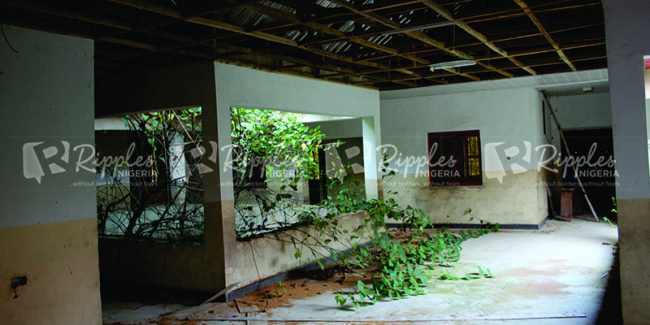
Abandoned N57 million IRDC health centre in Bateren
“IRDC has failed us. We don’t even need IRDC anymore. Since the inception of the IRDC, we cannot count how many persons Chevron has employed from the community,” Omamogho lamented.
‘Chevron Nigeria Limited is corrupt’
“NGOs and government should help us to talk to Chevron International because we believe that Chevron Nigeria Limited is corrupt. We want them to come and see the oil producing communities themselves to see how the communities are being underdeveloped,” Omamogho concluded.
Chevron said the abandoned IRDC projects in various communities were “due to the protracted internal leadership issues within the IRDC, the IRDC was unable to function from 2015 till 2018.”
The company said that it will start working soon to complete all the abandoned projects. “We are working with the new leadership of the IRDC to complete outstanding projects. We are aware that the leadership of the IRDC is already undertaking visits to the IRDC Itsekiri communities to assess their developmental needs in order to enable the IRDC complete on-going projects and propose new projects,” said Brikinn.
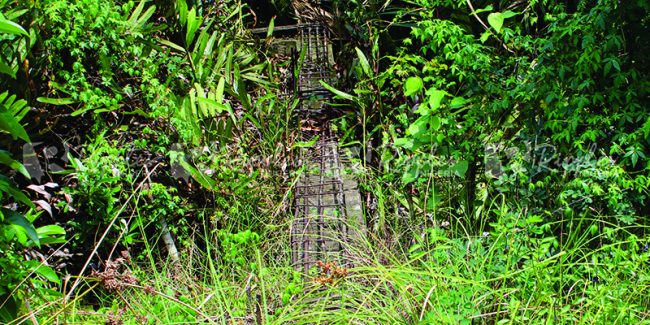
Location of the abandoned N116 million jetty covered by bush in Tebu
Though Chevron says these projects were abandoned as a result of the internal leadership crisis within the IRDC, it was however discovered that many of the projects awarded from 2007 were supposed to have been completed by 2013.
Omadino community governing board chairman, Emmanuel Oritsemeyimi who spoke at the court vented his anger on Chevron who he said has robbed the oil producing communities of their benefits.
‘Chevron has become a curse to Itsekiri people’
“Chevron who is supposed to be a blessing to us has become a curse to us. They take our oil from us and give us peanuts. They try to colonize some of our brothers (IRDC members) and give them money to fight the whole Itsekiri land,” he said.
“What we want is total cleansing in Iwereland (Itsekiri). As an Itsekiri man, we believe in justice. It is like Chevron taking a full cow from us and giving us the teeth of the cow. They are extorting and draining us, and using our brothers to fight us. They have called our brothers to themselves and made them illegal millionaires and these our brothers are in turn fighting us so that we will not get justice.
“IRDC and Chevron are devils. They are not doing anything and there is no development to show in Itsekiri land,” he stated.
Besides the four communities visited, there are many abandoned IRDC projects like two-bedroom detached bungalows, concrete jetty/walkway in Aja-Amita and the other remaining 19 Itsekiri communities that are yet to be completed.
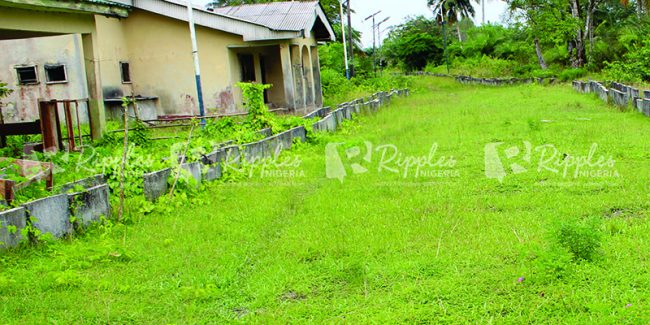
Abandoned road project in Bateren community
Many Itsekiri children are not happy with the underdevelopment in their communities despite the presence of oil companies in the region, including the National Association of Itsekiri Graduates (NAIG) and Movement for the Protection and Development of Iwere Homeland and History (MPIHDH).
NAIG President, Collins Edema said “The issue we have is with Chevron but the IRDC is an instrument being used by Chevron. The last time I was coming back I shed tears. We have people that have the golden eggs but cannot eat the shell of the eggs. It’s so pathetic. We have pregnant women and they do not know what antenatal care is. We don’t have access to health care and the mortality rate is very high.”
No job, no work but the cost of living is high
He said people spend more money as a result of the high cost of living, and that dwellers face severe hardship living in those areas and some people have deserted because there is no income.
Many parts of the communities are becoming a forest and for people who cannot afford the luxury of going to town to stay, they continue to drink bad water, while waterborne diseases will always affect them.
“I will blame Chevron because for IRDC to spend any money, Chevron has to approve of it. Chevron is a signatory to the IRDC accounts. That is the template. If there is poor execution of the contract and somebody selling the contract of abandoned projects and monies were released, Chevron is culpable. Why don’t they stamp their authority? Somebody in Chevron is colluding with some people. That is why we have abandoned projects littered everywhere,” says Edema.
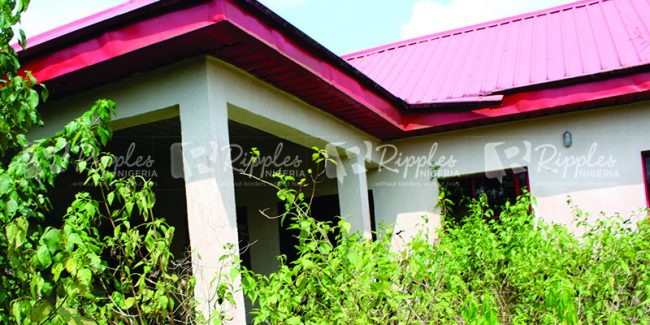
Abandoned N105 million IRDC Cottage hospital covered by weeds in Gbokoda
Amorighoye Mene, one of the claimants supports Edema, saying IRDC has been run by Chevron to defraud the people. “They are using the program to defraud the people because IRDC has not achieved its objectives. The managers of Chevron are short-changing the communities,”
“The people that Chevron put in charge do not have the capacity. They put the program in the hands of thieves who are not transparent and accountable for the money spent. Itsekiri have educated people and chevron finds it convenient to deal with illiterates”, he says.
Chevron Nigeria Limited in its reaction through Brikinn said “The IRDC has bank accounts that are administered under a strict governance model that ensures transparency and accountability. The funding provided by CNL is tied to various developmental projects proposed by the IRDC in accordance with the terms of the GMoU and these funds are paid into the IRDC’s bank accounts.”
When reached for comments, the incumbent Chairman of IRDC, Mr. Austin Oniyesan and the Secretary, Mr. Richard Omare refused to speak about the issue. They kept postponing a chance to talk, but finally stopped receiving calls and replying to text messages from our correspondent.
When asked if Chevron monitors the execution of awarded projects by IRDC, the company declined to react saying: “This matter is currently in court”.
“Chevron is giving a parting sum compared to what they are supposed to give. For instance, Bonny is being given N1 billion per annum while the whole Itsekiri has gas and crude oil, and they are giving us N500 million per annum,” says Edema.
“It’s not enough and we want more. We want them to develop our communities which they destroy because Chevron takes about N15 billion per day from our (Itsekiri) land.”



